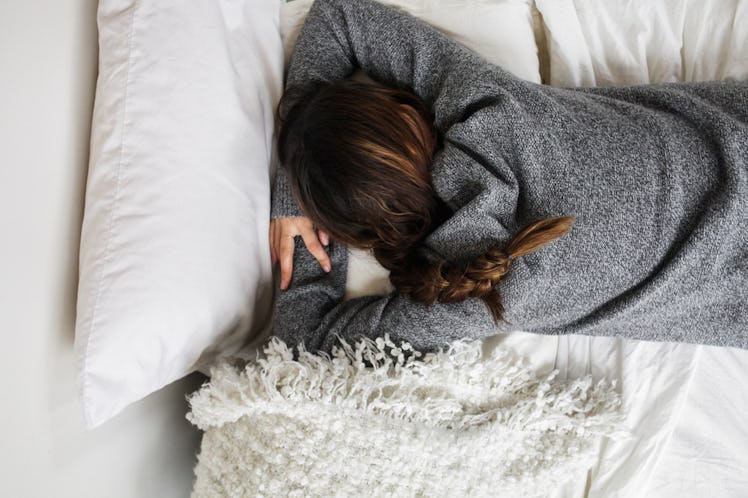
This Is How You Create A Bedtime Routine That Actually Works
Sleep can be the most elusive thing in your life sometimes, even when you feel flat-out exhausted. It quickly turns into a tricky, frustrating cycle: You're so tired that it becomes harder to fall asleep, so you don't sleep the requisite number of hours, and then you're even more tired the next day. But if you're having trouble getting some quality shut-eye within the confines of your busy schedule, it's high time you figure out how to have a sleep routine that will actually work for you and your individual body.
Coming up with a sleep routine that works for you is totally personal, and completely depends on the routines you already have in place right now. For example, if you spend 30 minutes catching up on the news and scrolling through social media before bed, you might want to focus on a little less screen time. In contrast, if you sleep in a hot, stuffy room, you might want to focus on creating a more cool, sleep-friendly climate.
Of course, there's no one-size-fits-all strategy for getting those much-needed seven to eight hours of sleep each night, but there are plenty of ways to work toward a healthier sleeping pattern. Here are seven quick ways to boost your bedtime routine and grab some extra Z's every night.
01Set Up Quiet Time Before Bed
Think about what it is you're usually doing in the hour leading up to going to bed. If you're doing anything loud or overly stimulating, you might have more trouble falling asleep.
Try setting up a quiet hour before bedtime: You can read, stretch, or even just take a hot shower. Slowing down before bedtime will help set up your mind and body for sleep, letting your brain and muscles know that it's time to decompress.
02Cut Your Caffeine Intake At The Right Time
If you're feeling wired right before bed, you might want to think about how much caffeine you had that day, and at what point in the day you had it.
Consider cutting off caffeine after 2 p.m. It's a great rule of thumb to keep it from disrupting your sleep cycle.
03Meditate For A Few Minutes To Clear Your Mind
Meditation is the name of the game, especially when your life is hectic and overbooked (side note: why does that feel like the standard these days?).
Meditating for five or 10 minutes at night is an amazing way to switch your overactive brain into a more relaxing mindset before going to sleep. I absolutely love the app Headspace, which offers endless options for different types of guided meditation.
04Do Your Best To Go To Bed At The Same Time Every Night
Sleep debt is real, people! You cannot catch up for lost sleep by snoozing for 15 hours on the weekend. The best thing you can do for your body is to try to create a consistent sleep schedule during the weeknights, and do your best to actually stick to it.
As always, you should be aiming for seven to eight hours of sleep each night. If you're not getting that much, try adding 15 minutes on either side of your sleep cycle. Then shoot for 20, then 30, and so on. Honestly, if you're hitting snooze for an hour every day, there's the room you need to work with.
05Pick A Ritual, And Stick To It
Everyone has different strategies that calm them into a sleepy state of mind. Whatever yours is, you should use it and stick to it every day. Creating a habit out of drinking warm milk before bedtime, or reading a few pages of poetry won't just calm you down, it'll also start to train your mind to know when it's time for bed.
If you do the same thing every night before you go to sleep, pretty soon, your body will view that activity as a sign that it's time to unwind.
06Limit Your Screen Time
If there's just one thing that you can do to help yourself sleep more soundly, it's to get rid of screen time in the moments leading up to bedtime.
Your phone and laptop screens are filled with blue light designed to keep you awake, and it basically tricks your mind into thinking it's daytime. If you absolutely have to use a phone or laptop just before going to sleep, make sure it's a few feet away from your face. But honestly, not using it at all is the best possible option.
07Snack On A Bedtime Treat Filled With Carbs And Protein
A good rule of thumb is to eat your last meal of the day about two to three hours before bed to allow enough time for digestion. But if you want a snack before you go to sleep, try something that's packed with carbs and protein, like a banana and peanut butter, which will keep you full without making digestion difficult for your body.